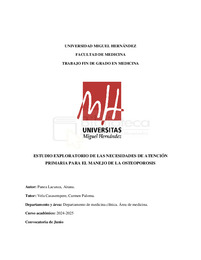Resumen :
Introducción: A pesar de su elevada prevalencia y su impacto tanto en términos de morbimortalidad como en costes económicos, la osteoporosis continúa siendo una enfermedad infradiagnosticada e infratratada, existiendo una brecha asistencial, pues un alto porcentaje de pacientes no recibe tratamiento antiosteoporótico tras una fractura por fragilidad. Aunque Atención Primaria debería desempeñar un papel clave en el abordaje de pacientes con osteoporosis, se ha reportado un aumento de las interconsultas dirigidas a Reumatología del Hospital General Universitario Dr. Balmis solicitando ayuda en el manejo de esta patología.
Objetivo: Analizar los principales motivos de derivación a Reumatología desde Atención Primaria y otras especialidades hospitalarias en relación al manejo de pacientes con osteoporosis.
Material y métodos: Se ha realizado un estudio observacional retrospectivo analizando las interconsultas recibidas en Reumatología por osteoporosis, desde el 1 de enero hasta el 30 de junio de 2024, registrando variables como edad, sexo, centro de origen y motivo específico de consulta.
Resultados: Se analizaron 238 interconsultas por osteoporosis, correspondientes a 215 mujeres y 23 varones, con una media de 67,17 ± 11,63 años. El 73,1% de las interconsultas provenían de centros de Atención Primaria, mientras que el 26,9% correspondían a especialidades hospitalarias, destacando Oncología (8,8%), Rehabilitación (5%) y Cirugía Ortopédica y Traumatología (3,4%). Los principales motivos de consulta fueron dudas sobre el inicio del tratamiento (29,7%), diagnóstico (13,9%), y mantenimiento del tratamiento (8,9%). Las interconsultas por dudas de tratamiento duplicaron en frecuencia a las relacionadas con el diagnóstico.
Conclusiones: Los resultados obtenidos reflejan la necesidad de desarrollar estrategias que mejoren el conocimiento y la capacitación de los médicos de Atención Primaria en el manejo de la osteoporosis, con especial atención en la toma de decisiones relacionadas con la farmacoterapia.
Introduction: Despite its high prevalence and significant impact in terms of both morbidity and mortality, as well as economic costs, osteoporosis remains an underdiagnosed and undertreated condition. A clear treatment gap persists, as a large proportion of patients do not receive anti-osteoporotic treatment after a fragility fracture. Although Primary Care Practitioners should play a key role in managing patients with osteoporosis, an increase in referrals to the Rheumatology Department at Hospital General Universitario Dr. Balmis has been reported, seeking support in the management of this disease.
Objective: To analyze the main reasons for referral to Rheumatology from Primary Care and other hospital specialties related to the management of patients with osteoporosis.
Methods: A retrospective observational study was conducted analyzing osteoporosis-related referrals received by the Rheumatology Department from January 1 to June 30, 2024. Variables such as age, sex, referring center, and specific reason for consultation were recorded.
Results: A total of 238 osteoporosis-related referrals were analyzed, corresponding to 215 women and 23 men, with a mean age of 67.17 ± 11.63 years. Of these, 73.1% came from Primary Care centers, while 26.9% were from hospital specialties, mainly Oncology (8.8%), Rehabilitation (5%), and Orthopedic Surgery and Traumatology (3.4%). The most frequent reasons for referral were questions regarding treatment initiation (29.7%), diagnosis (13.9%), and treatment maintenance (8.9%). Referrals related to treatment issues were twice as common as those related to diagnosis.
Conclusions: These findings highlight the need to develop strategies aimed at improving the knowledge and skills of primary care physicians in the management of osteoporosis, with particular emphasis on decision-making related to pharmacological treatment.
|
 La licencia se describe como: Atribución-NonComercial-NoDerivada 4.0 Internacional.
La licencia se describe como: Atribución-NonComercial-NoDerivada 4.0 Internacional.
.png)
